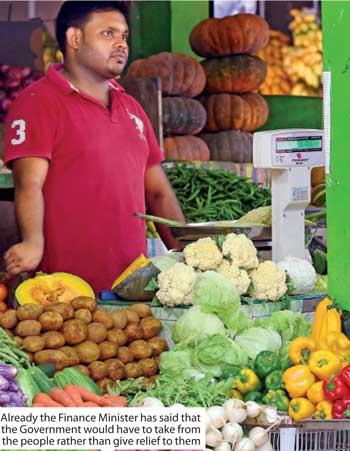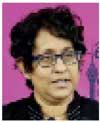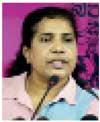Reply To:
Name - Reply Comment
 The much anticipated budget reading for the year 2022 will be presented on November 12, followed by the debates. But this time, people seem to have given up hopes as the Finance Minister himself said that the Government will have to take more from people rather than give them relief. In this backdrop many factions have questioned what the government’s priorities would be and whether they would allocate equal budgets for every sector. In order to make the public aware of the forthcoming budget the Progressive Women’s Collective (PWC) recently launched a budget forecast campaign titled ‘Who is the budget for?’ to make a critical analysis and present their findings to the public while allowing the latter to engage in a discourse via their social media platforms.
The much anticipated budget reading for the year 2022 will be presented on November 12, followed by the debates. But this time, people seem to have given up hopes as the Finance Minister himself said that the Government will have to take more from people rather than give them relief. In this backdrop many factions have questioned what the government’s priorities would be and whether they would allocate equal budgets for every sector. In order to make the public aware of the forthcoming budget the Progressive Women’s Collective (PWC) recently launched a budget forecast campaign titled ‘Who is the budget for?’ to make a critical analysis and present their findings to the public while allowing the latter to engage in a discourse via their social media platforms.
 Gendered-perspectives to be brought to light
Gendered-perspectives to be brought to light
Speaking at the launch, National People’s Power Parliamentarian Dr. Harini Amarasuriya said that the budget is an important indication of what the government’s priorities are going to be for the next year and also what government policies would be implemented in the coming year. “We all know that 2022 will be extremely challenging for all of us. We are facing many challenges on many different fronts; our foreign reserves are depleting and we are facing huge debts. In January we have to pay around USD 500 billion and by June, another USD 1500 billion. There’s a huge budget deficit and people are facing many challenges with the rising cost of living, scarcity of goods, loss of income and loss of livelihood opportunities,” she said.
She further spoke about the education and health sectors that are facing a crisis. “There are a few hints about what sort of a budget would be presented. Already the Finance Minister has said that they will have to take from people rather than give relief to them. We are yet to understand what he actually meant. The teachers have been fighting for a long time and we have to see whether this budget has met their demands. Those employed in the private and public sectors have requested for a Rs. 10,000 pay hike. People in the informal sector are at risk of losing their jobs. Therefore we need to ensure that these sectors will be covered in the budget,” she added.
The PWC will therefore examine the details of the budget and is planning to provide a gendered perspective of the budget which is usually being missed in budget analyses as well as when formulating budgets. “As a country we are very much behind in ensuring that gender issues are mainstreamed into budget preparations. We hope that with the analysis we provide that we will be able to provide greater analysis and awareness on the need to give more attention to issues of gender and differences when budgets are being formulated.” said
Dr. Amarasuriya.

We all know that 2022 will be extremely challenging for all of us. We are facing many challenges on many different fronts; our foreign reserves are depleting and we are facing huge debts. In January we have to pay around USD 500 billion and by June, another USD 1500 billion”
- Dr. Harini Amarasuriya National People’s Power Parliamentarian
Will the Budget serve justice to garment workers?
The garment sector was one of the few sectors that managed to generate revenue during the lockdown period. But workers reportedly worked in dire straights and were devoid of basic labour rights. At one point a COVID cluster emerged from the garment factories. “The forthcoming budget is presented at a time when the country is facing a huge economic crisis,” opined Chamila Thushari, Programme Coordinator at Dabindu Collective. “The Budget is presented at a time when the rupee is depreciating, prices of essential items are soaring and at a time when the government is unable to import essential items, tourism and foreign remittances are blocked and as a result money is being printed. The 2020 Central Bank Report states that the revenue generated by the garment sector was USD 317 million. In 2021 March it has increased to USD 467 million.
“But the garment workers sacrificed a lot in order to generate this revenue to the country. Many lost their jobs as the cadre was reduced and those who got the chance to remain had to work extra hours with a minimum salary and deducted allowances. Their targets were increased which meant they didn’t have time for lunch or a tea break. As a result their human rights were violated. From June 2020 to March 2021 they were paid a minimum salary of Rs. 14,000 or less. A majority of the workforce comprise women and they come from rural areas. Therefore this salary isn’t sufficient to cover their daily expenses,” added Thushari.
 Politicians aren’t interested in their well-being because their vote is cast elsewhere. These workers have to bear a huge cost to settle utility bills, rent and even pay for transport. Therefore we urge the Government to increase the relief they receive from Rs. 3500 to Rs. 5000 and increase their basic income from Rs. 16,000 to Rs. 25,000”
Politicians aren’t interested in their well-being because their vote is cast elsewhere. These workers have to bear a huge cost to settle utility bills, rent and even pay for transport. Therefore we urge the Government to increase the relief they receive from Rs. 3500 to Rs. 5000 and increase their basic income from Rs. 16,000 to Rs. 25,000”
- Chamila Thushari, Programme Coordinator at Dabindu Collective
She claimed that when garment workers were sent for quarantine their salaries were deducted. “There are single mothers in the Free Trade Zone who lost their jobs because they had to look after their children as daycare centres were closed. Some work on contract basis for manpower agencies and they don’t have an employer to take over their responsibility. Records from the Department of Census and Statistics show that a family of four needs around Rs. 75,000 for a month. So how can these workers live with a mere Rs. 16,000 salary?” She questioned.
Thushari also said that garment workers didn’t receive the Rs. 5000 allowance as they were not residents from respective areas. “Politicians aren’t interested in their well-being because their vote is cast elsewhere. These workers have to bear a huge cost to settle utility bills, rent and even pay for transport. Therefore we urge the Government to increase the relief they receive from Rs. 3500 to Rs. 5000 and increase their basic income from Rs. 16,000 to Rs. 25,000. The International Labour Organisation (ILO) has suggested to setup health committees in workplaces, but there’s no such establishment here. In fact the workplaces should be bearing all COVID expenses,” she added.
Where does the money go?
Given the regular shortage of essential items people ultimately had to end up in queues to ensure that they get their requirements at any cost. In most instances it was the women who had to attend to this task. “Any decision taken by the government has a direct impact on women,” said Samanmalee Gunasinghe, Coordinator, Women for Rights Organisation. “At present our women are in various queues. This is either for sugar, rice, gas, cement, milk powder, fuel or kerosene. Women who maybe sole breadwinners of their families have to waste time in a queue and purchase essential items this way.”
She also shed light on how the Government is planning to import rice and reduce taxes. “As a result the Government’s close associates can fill their pockets when in reality this money should actually be going to the treasury. In turn, people are burdened with more taxes and debts. On top of that are personal debts that most women have to service. Some are burdened with the microfinance and leasing mafia. Therefore we invite all women to join hands with us as we present our demands to the government on November 9.” said Gunasinghe.

At present our women are in various queues. This is either for sugar, rice, gas, cement, milk powder, fuel or kerosene. Women who maybe sole breadwinners of their families have to waste time in a queue and purchase essential items”
- Samanmalee Gunasinghe, Coordinator, Women for Rights Organisation
An embarrassing situation
Prices of several items that were reduced prior to the election too have increased. “Prior to the election, a kilo of dhal was Rs. 60 and salmon was Rs. 100. But today, a kilo of dhal is Rs. 260 and salmon costs Rs. 360,” said Saroja Paulraj of PWC. “So we would like to see what the Finance Minister has in store for the people this time. Price controls have been lifted. A kilo of rice is being sold between Rs. 110-115. During the previous two months the daily expenditure of a family of four has increased by Rs. 10,000. So we demand that this Rs. 10,000 be allocated from this budget. The government should also increase the salaries of private and public sector employees by Rs. 10,000. Recently, Basil Rajapaksa said that the Government will have to take from the people during this Budget, but people have made every sacrifice possible. Every 10 hours there are protests – either farmers, laborers or teachers. A person running a boutique cannot meet his daily expenses.” opined Paulraj.
She further said they expect the Government to make a 52% allocation in terms of women’s affairs when allocating a Budget to the relevant Ministry. “But it is reported that a huge chunk of the forthcoming Budget will be distributed among certain front-liners of the Rajapaksa family. People don’t elect a Government to raise one family. The forthcoming Budget should at least allocate basic facilities and allowances for people. The COVID pandemic affected all countries, not just Sri Lanka. But even amidst this situation they have provided tax concessions to their close associates. If they are going to collect more taxes from people we will take to the streets along with women,” she said.
 A kilo of rice is being sold between Rs. 110-115. During the previous two months the daily expenditure of a family of four has increased by Rs. 10,000. So we demand that this Rs. 10,000 be allocated from this budget. The government should also increase the salaries of private and public sector employees by Rs. 10,000”
A kilo of rice is being sold between Rs. 110-115. During the previous two months the daily expenditure of a family of four has increased by Rs. 10,000. So we demand that this Rs. 10,000 be allocated from this budget. The government should also increase the salaries of private and public sector employees by Rs. 10,000”
- Saroja Paulraj of PWC
Referring to a report by the Department of Census and Statistics, Paulraj said that a family of four needs around Rs. 76,158 as monthly income in order to meet expenses. “But more than 20,00,000 people earn a basic income of Rs. 800 or less. So how can they provide education and nutrition to their children? If we take the estate sector, ever since the shortage of gas, women have to spend around two hours looking for firewood and water. The Government is now trying to cut-off the pension scheme as well. These are clear indications that the Government is taking its people back to the Stone Age. The Government is misusing state money. A Government that spoke about a digital revolution has made people stand in queues to purchase daily needs. This is quite embarrassing,” she complained in her concluding remarks.